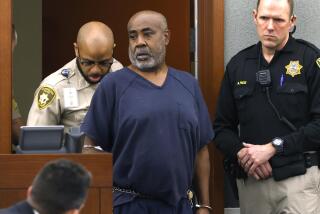Killer’s death sentence is restored
In another reversal of the U.S. 9th Circuit Court of Appeals, the Supreme Court on Monday restored a death sentence for a two-time Arizona murderer who told the sentencing judge, “If you want to give me the death penalty, just bring it right on.”
The judge accepted this invitation and, in 1990, sentenced Jeff Landrigan to die for the murder and robbery of Chester Dyer in Phoenix. Landrigan had gone to Arizona after escaping from a prison in Oklahoma, where he was serving time for murder.
During his sentencing hearing, Landrigan said he did not want his mother or his ex-wife to testify on his behalf. He also told the judge he wanted no mitigating evidence to be considered.
Yet he appealed his death sentence, and last year the 9th Circuit overturned it, agreeing with his claim that his trial lawyer had been ineffective for not investigating such evidence on his behalf. It faulted the lawyer for failing to look into Landrigan’s troubled childhood.
In a 5-4 decision Monday, the Supreme Court reversed that ruling and said Landrigan’s “exceedingly violent past” made him a fitting candidate for the death penalty.
Justice Clarence Thomas wrote the court’s opinion, and Chief Justice John G. Roberts Jr. and Justices Antonin Scalia, Anthony M. Kennedy and Samuel A. Alito Jr. joined him.
The decision was the third this year to restore a death sentence or murder conviction that had been overturned by the 9th Circuit. Since October, the Supreme Court has reversed 11 rulings by the 9th Circuit and affirmed only one, an obscure business dispute.
Monday’s decision shows that the court remains closely split on capital punishment, with Kennedy holding the deciding vote.
Last month, for example, the court overturned the death sentences of three murderers in Texas -- all by 5-4 votes, with Kennedy joining the court’s liberal faction in the majority. The court ruled that Texas had deprived jurors of a fair chance to consider mitigating evidence that might call for sparing each defendant’s life. In the late 1970s, the Supreme Court held that a jury or judge considering a death sentence must be permitted to weigh any evidence that calls for leniency.
In the Arizona case, Kennedy joined with the court’s conservative bloc to uphold the death sentence because the defendant had told the sentencing judge he did not want mitigating evidence considered.
Landrigan objected when his lawyer brought Landrigan’s mother and ex-wife to court to testify on Landrigan’s behalf.
“Mr. Landrigan, are there mitigating circumstances I should be aware of?” the judge asked.
“Not as far as I’m concerned,” he replied.
Asked if he had any concluding comments, Landrigan said, “I think the whole thing stinks. I think if you want to give me the death penalty, just bring it right on. I’m ready for it.”
His subsequent appeals lost in the Arizona courts and before a federal judge. But last year, the 9th Circuit Court ruled 9 to 2 that he deserved a new hearing.
The high court’s majority dismissed the 9th Circuit decision and said the Arizona courts reasonably upheld the death sentence.
“Landrigan’s mitigation evidence was weak,” Thomas wrote, and the judge “had seen firsthand his belligerent behavior.”
Justice John Paul Stevens wrote in the dissent that “a more thorough investigation” by Landrigan’s trial lawyer would have revealed Landrigan had an “organic brain disorder, which would have explained not only his criminal history but also the repeated outbursts at sentencing.”
Though such evidence might not have persuaded a judge or jury to spare his life, it should be examined in a further hearing before Landrigan is put to death, he wrote.
Justices David H. Souter, Ruth Bader Ginsburg and Stephen G. Breyer joined his dissent.
More to Read
Start your day right
Sign up for Essential California for news, features and recommendations from the L.A. Times and beyond in your inbox six days a week.
You may occasionally receive promotional content from the Los Angeles Times.







